Film (2015)
Directed by Danny Boyle
Screenplay by Aaron Sorkin
With Michael Fassbender (Steve Jobs), Kate Winslet (Joanna Hoffman), Seth Rogen (Steve Wozniak), Jeff Daniels (John Sculley), Michael Stuhlbarg (Andy Hertzfeld), Katherine Waterston (Chrisann Brennan), Perla Haney-Jardine (Lisa Brennan, age 19)
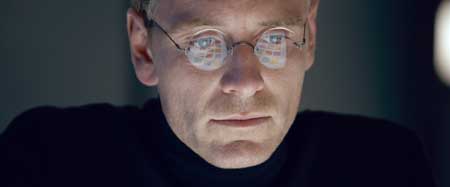
in “Steve Jobs”
Photo: François Duhamel
© 2015 Universal Studios. ALL RIGHTS RESERVED.
As almost everybody knows, Steve Jobs (Michael Fassbender) was, in many ways, the inventor of the personal computer. He was also a leader in the computer industry for decades. He introduced the Macintosh, the first personal computer with a graphical user interface, was not long afterwards fired from Apple, started NeXT computer which was subsequently bought by Apple, turned Pixar into an animation powerhouse, returned to Apple, invented the iMac, the iPod, iPhone and the next generation of computers and built Apple into one of the most powerful companies in the world.
Noted screenwriter, television writer and playwright Aaron Sorkin has taken an angular approach to Jobs by focusing on three episodes told through the construct of several different product launches. The first occurs in 1984 with the release of the Macintosh, the second in 1988 with that of the NeXT computer, and the third in 1998 with Jobs’ return to Apple and the announcement of the iMac.
Sewn throughout the narrative is an account of Jobs’ relationship with his first child, Lisa (portrayed by three different actors at different ages, with Perla Haney-Jardine at age 19), whom he did not initially acknowledge as his own, through the years of her late adolescence.
As well, Jobs’ relationship with Joanna Hoffman (Kate Winslet), a long-time Apple employee who did marketing on the Macintosh, then went with Jobs to NeXT and stood by his side through many ups and downs, is significantly profiled.
Jobs’ agonistic relationship with Steve Wozniak (Seth Rogen), his co-founder in Apple, becomes a major theme, as does that with early and influential Macintosh programmer and developer Andy Herzfeld (Michael Stuhlbarg), and that of John Sculley (Jeff Daniels), Jobs’ one-time colleague and supporter who usurped him as CEO at Apple.
The film is, unlike Sorkin’s The Social Network (2010) about Mark Zuckerberg and Facebook, not a linear account of the development of a company, but more a series of snapshots.
Whereas Facebook was not even a decade old when Sorkin wrote The Social Network, his terrain, in Steve Jobs, potentially might have covered over thirty years. Instead, Sorkin’s choice is to drop down into three focal times, characterize them by the project innovations that occur at the time, and then tell the several continuing stories through the lens of the announcement of those products.
The overall effect, strangely, is a little claustophobic – like the feeling in Alejandro González Iñárritu’s Birdman (2014), which is filmed almost entirely inside a Broadway theater and which involves the attempt through unique camera work to give a sense of urgency and dynamism despite the confined spaces.
Here, too, in Steve Jobs, the scenes are largely set in various theaters where the product releases are given and the sense of drama is created by a roving camera that moves relatively excitedly to compensate for the closed spaces.
Director Danny Boyle’s rough and ready style, most vivid in his masterpiece, Slumdog Millionaire (2008) enables this sort of rough-cut, jostling sense to create a feeling of near-frenzy despite the confines of the specified locale.
This works quite well for much of this story, which counterposes the extreme perfectionism of Jobs’ aesthetic with his uncontrolled sense of human interaction.
Known both for his leadership and vision, and for his difficult personality, Jobs could at once convey a sense of refinement and exhibit a personal brutality that did not pair easily. Boyle’s capacity to draw both qualities out of his cast and out of his assigned setting makes for an interesting take on his demanding subject.
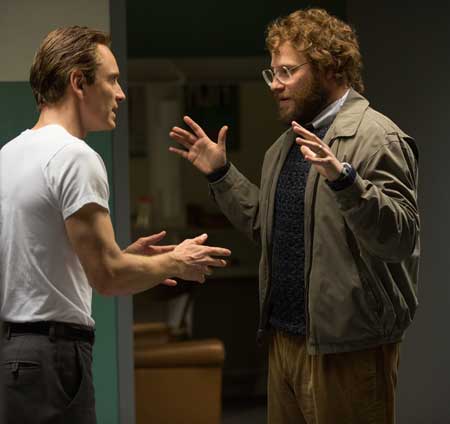
Seth Rogen as Steve Wozniak
in “Steve Jobs”
Photo: François Duhamel
© 2015 Universal Studios. ALL RIGHTS RESERVED.
Sorkin’s screenplay moves from a rapid-patter start, very reminiscent of his West Wing (1999-2006) scripts on television in which Jobs talks quickly with his cohort about what is going to make the Macintosh unique and why all of its features including its capacity to enunciate language must at all costs be included in its project launch demonstration.
As the film progresses and the story of Jobs and his daughter makes for more forceful emotion, the texture changes to a kind of tense drama with less rapid back and forth. In the context of the film, this feels a bit strange, somewhat like trying to tenderize meat that should be left chewy; one understands, nonetheless, why Sorkin and Boyle have decides to go this route.
One might argue that the film gets soggy as a result, but, frankly, I think that’s not where the real issue lies. Rather, the problem is that throughout the film we get a vision of what Jobs’ behavior is like but never really get a sense of his motivating instincts for acting that way. Sorkin tries to argue that something about Jobs’ being an adoptee explains his insecurity and power-hungriness, but none of these explorations really feels very probing or satisfying.
Essentially, one gets Steve acting like an asshole, being cavalier and autocratic, then capitulating – especially to Chrisann (Katherine Waterston), the mother of his first child Lisa – but one doesn’t really get why. The Social Network generally does a better job of tracing the motivations and complexities of its protagonist. Here one is left – not uncommon in the case with many studies of Jobs – wondering how he could have been so great in so many ways and yet so unremittingly insensitive at times.
Without a doubt, Michael Fassbender creates a portrait of Jobs that is powerful and unsettling. At times his portrayal satisfyingly exhibits Jobs’ poignant confusion, and when the script allows the character a moment of reflection, Fassbender rises ably to the occasion. But there’s not very much space for that here since the action is set in the context of frenetic product releases and most of the interactions are dramatic confrontations that are captured right before Jobs goes onstage. Though cleverly conceived and sometimes wittily executed, the turbulent narrative strategy actually serves to disable the most potentially interesting and subtle parts of this sort of character study.
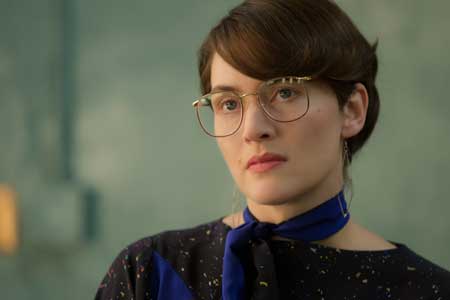
in “Steve Jobs”
Photo: François Duhamel
© 2015 Universal Studios. ALL RIGHTS RESERVED.
Kate Winslet gives a saltily appealing portrayal of Joanna Hoffman who apparenlty was one of the Apple team who could confront Jobs without getting fired. We’re never quite sure why this is, though it’s interesting to see that it is. But, again, it would have also been nice to understand why her confrontational relationship with Jobs worked while other confrontational relationships with him were so disastrous. The film doesn’t really answer that, or even explore it much.
Jeff Daniels as John Sculley the Pepsi CEO who comes to Apple, takes it over at Steve Jobs’ invitation, then is instrumental in getting Jobs booted out of Apple, gives a sweetly avuncular portrayal. The real Sculley, at least from afar, always seemed a bit more ambitiously aggressive than is the character that Daniels plays here, but for some not particularly evident reason Sorkin’s script makes more of his and Jobs’ friendship and affiliation than one might expect.
Steve Wozniak was Jobs’ partner in setting up Apple, and Seth Rogen gives him a heartfelt and warm depiction, holding up the end of righteously standing by the original Apple II team and demanding recognition for them when Jobs refuses to give it. Rogen has a bear-like appearance, as does the real Wozniak, and plays the part with sweetness, emphasizing, with his conveyance of Sorkin’s script (as do many of the historical reports), that Wozniak nobly spoke on behalf of some of the early employees scorned and scarred by Jobs.
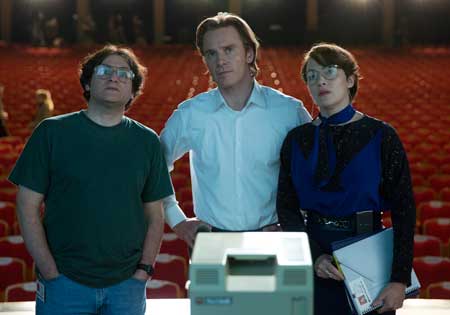
Michael Fassbender as Steve Jobs
Kate Winslet as Joanna Hoffman
in “Steve Jobs”
Photo: François Duhamel
© 2015 Universal Studios. ALL RIGHTS RESERVED.
Michael Stuhlbarg, seen recently in the chess film about Bobby Fischer Pawn Sacrifice, and notably in the Coen brothers’ masterful A Serious Man (2009), gives a good run as Andy Hertzfeld, one of the early and central Macintosh programmers who was tormented by Jobs into producing results more efficiently and quickly than humanly possible. With a long, lingering gaze that speaks outrage and vulnerability in one fell swoop, Stuhlbarg creates a Hertzfeld who, like Rogen’s Wozniak, rises up through his soft-spokenness to stand defiantly before Jobs.
This film might have been titled Steve Jobs: Three Vignettes, since it intentionally leaves out much of Jobs’ story. It ends in the late nineties, well before Apple’s tumultuous success with the iPod and the iPhone. It also avoids at least one crucial part of Jobs’ career, that of his involvement with Pixar which, as watershed first turned him into a billionaire. More significantly, the film does does not mention that by the time of the third vignette Jobs is happily married to Laurene Powell and has parented several children with her.
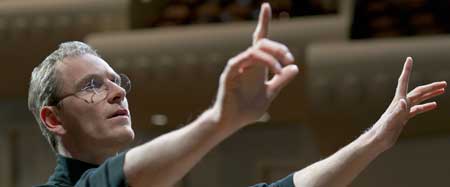
in “Steve Jobs”
Photo: François Duhamel
© 2015 Universal Studios. ALL RIGHTS RESERVED.
There is one odd scene in the film when we see Jobs dipping his feet in a toilet before he goes out on a product launch. It’s clearly meant to signify a whole range of unique and often peculiar behaviors for which Jobs was known, but here it comes somewhat out of context and we’re not sure what it really represents. That abbreviated suggestiveness is representative of the film’s general approach, which seeks to encapsulate the essence of Jobs in a few slices of time. The result is potent and unsettling, but, for those who know something more about Jobs’ life and career, somewhat limited and episodic.
Nonetheless, Sorkin and Boyle know how to make good drama, and even if it’s only a distilled and partial evocation of Jobs’ legacy, it gives a sense of the emotional urgency, psychological complexity and sustained determination of project and vision that characterized its protagonist’s life and career.
– BADMan
Leave a Reply